|
THE LOVE THAT DARE NOT SPEAK ITS NAME
Read on, adventurer.
There can't be much doubt that
Cinematronic's 1983 laserdisc coin-op Dragon's Lair is the most successful videogame in the history of the
world that nobody will admit to liking. For over 20 years, Dragon's
Lair games have been coining in cash hand-over-fist, while drawing
nothing but bile from press and critics. This isn't some
flash-in-the-pan phenomenon like Rise Of The Robots or the videogame
versions of Who Wants To Be A Millionaire?, where big initial
success was followed by disaster as consumers with burnt fingers
pointedly ignored the attempted sequels and the franchises died a
death - Dragon's Lair has been doing exactly what it always did for
over two decades now, and yet the name's still a moneyspinner. So
how come nobody's got a good word to say for it?
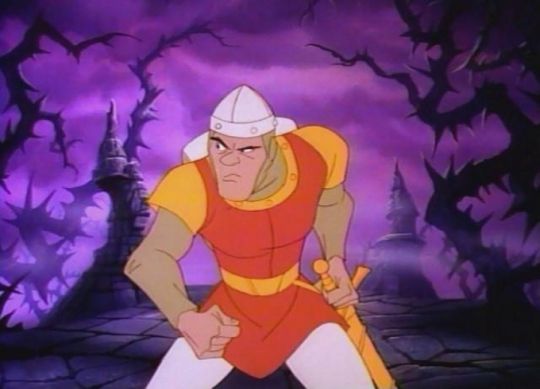
The incomparable Dirk The Daring. The castle's behind
you, you idiot.
Well, your reporter
has a confession to make. I like Dragon's Lair. There, I've
said it. Oh, it's not the best game in the world or anything, not
even in the top 100, but there's a simple, honest charm about DL
that makes all the venom regularly heaped on it both terribly unfair
and difficult to understand. It's aesthetically superior to games 20
years its junior, and has gameplay that's fundamentally very little
different to that of hugely-acclaimed modern-day titles. It's
popular enough with the gaming public to have generated not only
dozens of games but also a
merchandise
line to rival anything short of Mario and Pac-Man.
It's been
converted to just about every format imaginable (there's barely been
a gaming system since the ZX81 that didn't get some sort of Dragon's
Lair title), sometimes in several different forms
- there are at least ten distinct DL games, never mind all
the various ports. It's got atmosphere,
brilliant characters and, in the gormless yet indefatigable Dirk The
Daring, a loveable hero who oozes personality despite never saying a
word. And yet, it's become a byword for everything that's bad about
the "interactive movie" style of gaming, when there are many worse
offenders that are almost universally critically adored. Half-Life, say.
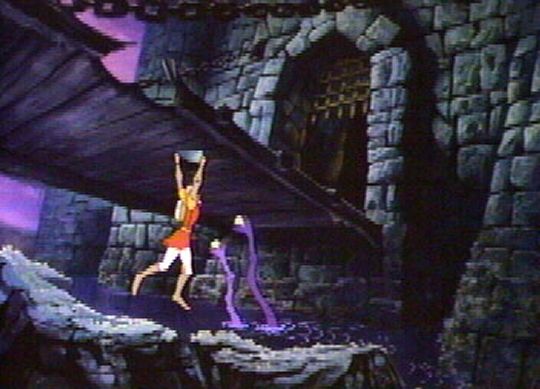
You do wonder how such a rickety drawbridge
supports a dirty great dragon. Presumably he flies in.
No, I'm not joking. Half-Life is
almost as linear and pre-scripted as Dragon's Lair, and is just as
happy to kill you instantly if you take a single step in the wrong
direction. (The difference is, in Dragon's Lair at least you get a
chance to make the right move first. Half-Life will quite
happily kill you with zero warning just to move the story along, and if you
inconveniently happen not to have quick-saved beforehand then that's
just your tough luck. Enjoy trekking through everything from your
last save point again.)
Then, of course, you've got Final
Fantasy, an "interactive movie" that does away with most of the
actual interacting (unless you count all the frantic pounding on the
X button desperately trying to move the endless dialogue along, of
course) - and which as a movie is overblown, pretentious sixth-form
drivel compared to the punchy, funny, get-to-the-point Disney
heritage of Dragon's Lair. Do we even have to start on the
blockbusting Metal Gear Solid 2? Didn't think so. Compared to any of
those, Dragon's Lair is Super Mario 64, gameplay-wise. Yet they're
all heralded as masterpieces, while Dragon's Lair - for this
reporter's money, twice as much fun as any of them - is sneered at and
vilified. Huh?
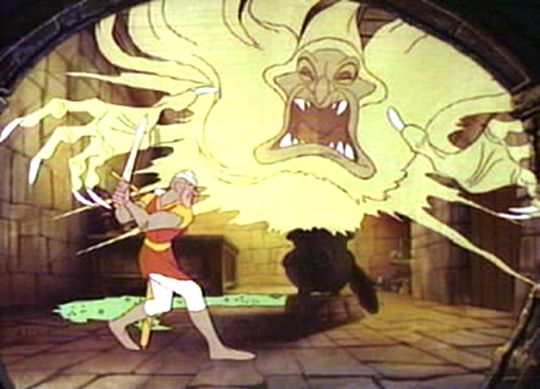
We've all had kitchen days like this, right?
"But wait!", yells some
ill-mannered oaf. "You can't compare games like those, where you
have total control over your character all the time, with some
rubbish where you just watch cartoons then press one button every
few seconds." Tsk. Pay attention, thicky. Half-Life is every bit
as much about making a single correct decision at a crucial moment
as Dragon's Lair is. The fact that you have to do all the mechanical
trudging between the important bits by yourself doesn't actually add
anything to the gameplay. But let's see if we can find some even
clearer examples that even a total buffoon will be able to follow.
You won't find many games more
uniformly adored than Konami's Dance Dance Revolution / Dancing
Stage series, or Nintendo's magnificent GBA classic Wario Ware Inc.
And rightly so, for both (especially the latter) are tremendous. But
what do you actually DO in them? In DDR, you get a visual cue for an
action, which you then have to execute with precise timing - a
microsecond off and you'll blow your whole score, and several such
minor timing errors will end your game. In Wario Ware, you're
presented with hundreds of mini-scenes in which you have only a
second or two to figure out exactly what you're supposed to do AND
execute it, using one or two presses of four joypad directions and a
single fire button - in other words, exactly what happens in
Dragon's Lair. These games may all be presented in very different
ways, but their core gameplay mechanic is identical. So why love
them and hate this?
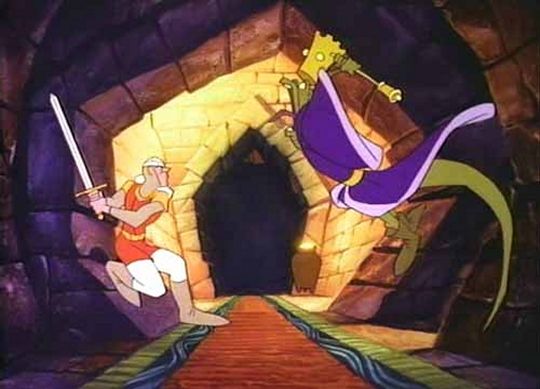
The Lizard King was perpetually angry about
being named after a smelly hippy loser.
(Something else which Wario Ware
shares with Dragon's Lair, incidentally, is that both games are
especially well suited to handheld formats - WW is the ultimate
two-spare-minutes-while-waiting-in-the-chip-shop-queue game, while
the Game Boy Color version of DL is a superbly-implemented
conversion which you can play right through in a 20-minute bus or
tube journey.)
In fairness, some awful versions of
Dragon's Lair have sullied its name somewhat. The DVD player/PS2
version was terrible, removing the crucial audio clues which made
the game a lot easier to play; the NES version, which turned the
game into a side-scrolling semi-puzzler, was absurdly hard without
the stunning graphics to make up for it; the 2D platform version on
the SNES looked good but left a lot to be desired in the gameplay
department; and the 2003 multi-format 3D remake was simply an
atrocity (see the review on Digiworld
for more detail). But it isn't these games people are generally
referring to when they're slagging off Dragon's Lair, it's the
original coin-op. Which, when you think about it, is pretty bizarre.
And why, exactly?
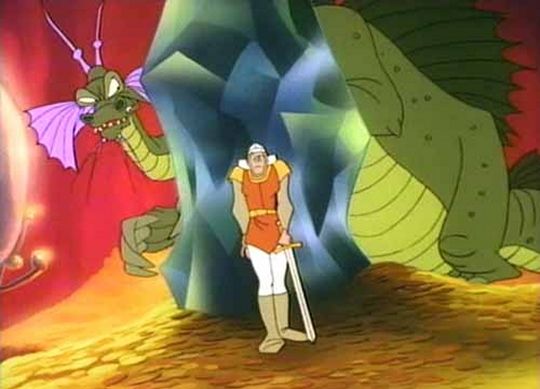
Dirk and Singe caper on the big piles of gold and treasure Dragon's
Lair made for Cinematronics.
Because the thing Dragon's Lair most
often gets stick for is for changing the face of arcades. In 1983,
arcades were at the peak of their powers - jammed full of both
punters and a stream of inventive, original, exciting games. DL
represented a quantum leap in technology, but at the expense of
having incredibly shallow gameplay compared to the other hits of the
time, and was much more expensive to play. Despite this it was a
huge success, and critics often identify this victory of narrative
over substance as the beginning of the end for the arcade's golden
age, and the first step towards the more corporate era of
big-business gaming we now inhabit.
And yet, what are the games that even
the hardest of hardcore race out in their millions to buy nowadays?
Mega-budget, corporate, aesthetically-extravagant, narrative-driven
titles like the aforementioned Final Fantasy, Half-Life and Metal
Gear Solid 2. Perhaps what they don't like is the mirror Dragon's
Lair holds up to their own shallow souls - the reminder of the day
they all sold out for eye candy and a veneer of sophistication
beyond DL's "childish" cartoon fun. Or maybe they're just sore that
having sold out for surface glamour 20 years ago, they're still
waiting for something this pretty to come along again.

"Does this glass bubble I'm imprisoned in make
my bum look big?"
But then, that's probably being
terribly unfair to the mainstream gamer. As we noted right back at
the start of this piece, mainstream gamers lap up Dragon's Lair
games like ice cream sundaes with extra strawberry sauce. If you go
to the Amazon
entry for the GB Color version, you'll find the customer review
rating sitting at an impressive four-stars average, and that's for
the version with the crudest visuals and the worst sound of all the
arcade-DL ports in history.
It's only the hardcore, the critics
and the reviewers who tend to have it in for Lair and its ilk, and
that may be because a game like Dragon's Lair renders both criticism
and years of carefully-accumulated gaming expertise worthless.
Everything it has to offer is right up front on the surface, anyone
can see for themselves in a matter of seconds what this game is
about, decide for themselves if they're interested in it or not, and
start playing it instantly. It doesn't need years of practice, it
doesn't need explaining, it doesn't need judging. And speaking as a
critic, there's nothing we hate more than having our very reason to
exist taken away from us.
|

